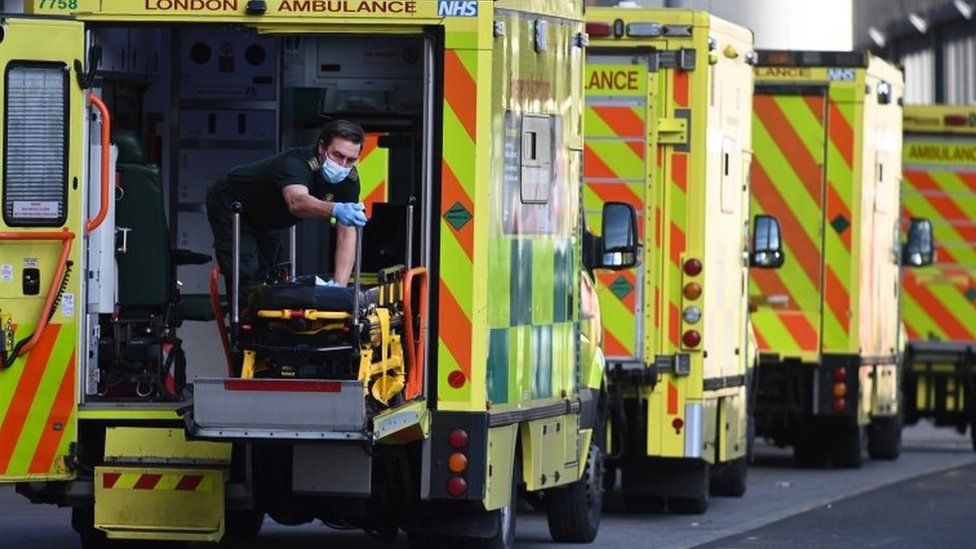ARTICLE AD BOX
 Image source, EPA
Image source, EPA
By Nick Triggle and Jim Reed
BBC News
More than 10,000 ambulances a week are caught in queues of at least an hour outside accident-and-emergency units in England, a BBC News analysis shows.
The total - the highest since records began, in 2010 - means one in eight crews faced delays on this scale by mid-November.
Paramedics warned the problems were causing patients severe harm.
One family told BBC News an 85-year-old woman with a broken hip had waited 40 hours before a hospital admission.
She waited an "agonising" 14 hours for the ambulance to arrive and then 26 in the ambulance outside hospital.
When finally admitted, to the Royal Cornwall Hospital, which has apologised for her care, she had surgery.
Ambulance system 'facing perfect storm'
Both ambulance response times and A&E waits have hit their worst levels on record in all parts of the UK in recent months.
In Cornwall, patients facing emergencies such as heart attacks and strokes are now waiting more than two hours on average for an ambulance. The target is 18 minutes.
They are thought to be among the worst delays in the country but none of England's ambulance services is close to the target, while Wales, Scotland and Northern Ireland are all missing their targets.
Alongside Cornwall, parts of Gloucestershire, Lincolnshire, Somerset and Bristol have the longest waits, Freedom of Information requests by the Liberal Democrats have revealed.
A key problem is the delays ambulances face handing over patients to A&E staff.
This is meant to happen within 15 minutes of arrival - but, as the BBC News analysis shows, regularly takes longer.
The College of Paramedics said crews were facing a "perfect storm", with the queues outside A&E preventing them reaching patients who need a 999 response.
College chief executive Tracy Nicholls said: "We all know patients are coming to harm and in some cases severe harm."
Government and local health chiefs' attempts to tackle the problems were "not really making a dent" in the delays, she said, and the system was facing gridlock.
And even when patients are admitted into A&E, they can face long waits for a bed on a ward, with hospital bosses blaming a shortage of beds and problems discharging patients back into the community.
Marianna Flint's 85-year-old mother, Koulla, is just one of thousands of patients a day caught up in the problems.
Having fallen at home, in August, she had been left in "excruciating pain" lying on the floor overnight, her daughter said.
When the ambulance finally arrived, Koulla was given pain relief, but it then had to join a queue of 30 outside the Royal Cornwall.
Image source, Other
Image caption,Koulla's family have received an apology from the hospital over the problems with her care
She then faced many hours in A&E being being taken for surgery. At one point, she was left in her own urine while she waited.
Ms Flint, 53, said: "It was awful. You feel helpless because you're giving your trust over to them to look after a family member who's in agony and who needs surgery."
She has since received a written apology from the Royal Cornwall for the care provided to her mother.
The trust said it was "sincerely" sorry for the failings.
Ms Flint said: "I almost feel sorry for those looking after her. It's not down to them. There was no room inside to accept her in."
Unions have cited the problems facing the emergency-care system as one of the factors motivating members to strike.
A strike by members of the Royal College of Nursing is planned for 15 and 20 December in England, Wales and Northern Ireland, while earlier this week the two main unions representing ambulance staff said their members had also backed walkouts.
Have you experienced a long wait for an ambulance or at A&E? Share your experiences by emailing haveyoursay@bbc.co.uk.
Please include a contact number if you are willing to speak to a BBC News journalist. You can also make contact in the following ways:
If you are reading this page but cannot see the form, visit the mobile version of the BBC website to submit a question or comment, or email HaveYourSay@bbc.co.uk. Please include your name, age and location with any submission.

 2 years ago
27
2 years ago
27








 English (US) ·
English (US) ·